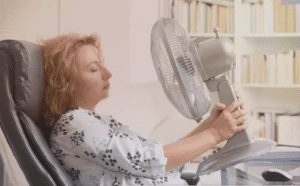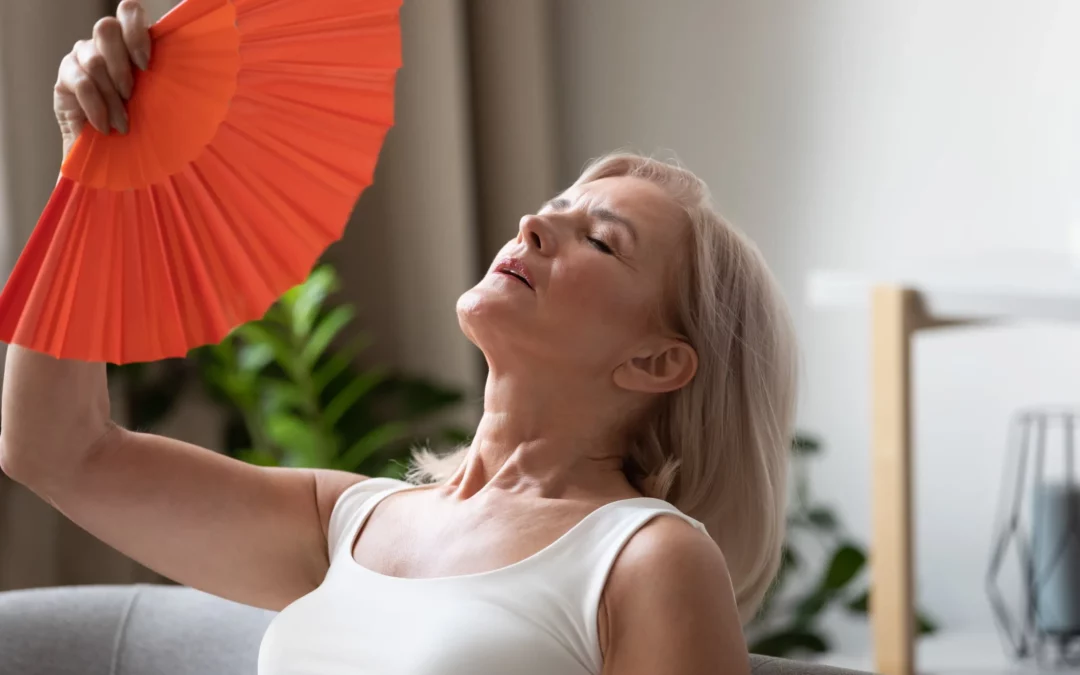Hot flashes are sudden feelings of intense heat that start in your chest and travel to your neck and head. In some cases, it is associated with no sweating, while other women sweat profusely, a condition termed hyperhidrosis. When sweating leaves you and your clothes drenched at night, it is called night sweating or hyperhidrosis. Your body might experience chills and a rapid heartbeat upon losing too much body heat.
Doctors have linked hot flashes with changes in hormonal levels, especially estrogen, as in perimenopause or menopause. Perimenopause is the time just before menopause that occurs between the ages of 45-55 years of age.
What are the symptoms of Night sweating/hot flashes?
Hot flashes are characterized by a sense of warmth that spreads through your chest to your neck and face, red and blotchy skin, a fast heartbeat, sweat in the upper body, feeling cold as the episode of night sweating passes by, and anxiety.
This episode of extreme discomfort lasts for almost 5 excruciating minutes. In the case of severe flashes, they may attack 3-4 times in an hour, 20-30 times a day. Night sweats often wake up women from their deep slumber.
It is estimated that up to 75% of women in the United States experience this condition. Out of which, for 25-25% of women, these flashes are so extreme that they disturb their lives. Some fortunate ladies don’t have flashes at all, while others experience only mild ones.
Most women have reported experiencing hot flashes on a daily basis. On average, hot flashes prevail for 7-10 years.
What are the causes of hot flashes?
Changes in hormonal levels before, during, and after menopause cause hot flashes, though the exact mechanism is unclear. As per researchers, decreased estrogen levels cause your hypothalamus, i.e., your body’s thermostat, to become increasingly sensitive to subtle changes in body temperature. When your hypothalamus detects warmth in your body, it turns on the means to cool it off.
Very infrequently, night sweats are induced for some other reasons as well, such as adverse effects of medicine, thyroid issues, cancers, or chemotherapy.
Which women are most at risk of developing hot flashes and what triggers these episodes?

Woman hot flashes episodes
There is no particular reason why some women experience hot flashes while others don’t. But factors that make you an easy target include smoking, a high body mass index, i.e., obesity, and race, as hot flashes are less reported in Asian women than others, especially black women.
Knowing the culprits can help the person stay as far away from triggers as possible. The triggers include active or passive smoking, wearing tight, restrictive clothing, using heavy sheets on the bed, consumption of alcohol or caffeine, using too many spices in food, keeping rooms warm, or excessively stressful situations that can trigger periods of hot flashes.
What are the complications associated with hot flashes or night sweats?
Hot flashes have a massive impact on the quality of life. It completely disrupts your sleeping pattern and leaves you sleep-deprived for a long period of time. This may complicate things further as you may feel depressed, unfocused, or agitated throughout the day.
Scientists also suggest that women experiencing hot flashes have a higher probability of having cardiac problems and bone issues than women who do not go through hot flashes.
Can you prevent hot flashes?
You cannot avoid hot flashes, but you can dodge the triggers. Staying away from stress, caffeine, alcohol, etc. might help you sustain a better sleep routine.
Apart from that, try to keep yourself cool. Use a ‘’Chill pillow’’ if required. Wear loose, lightweight clothes made of natural fabric. Practice deep breathing for about 15 minutes in the morning, 15 in the evening, and whenever a hot flash begins. Exercise daily.
Add plant estrogens to your diet. They are present in soy products such as tofu and edamame. These estrogens impart weaker estrogen-like effects. Herbal products may have side effects or interactions with other medicines you take, so it is only wise to consult and discuss with your doctor first.

